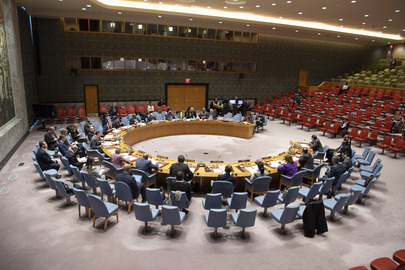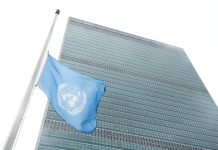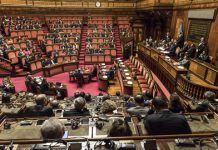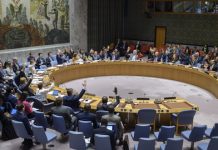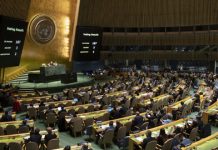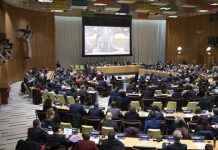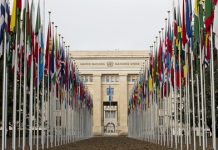Prime Ministers of Vanuatu, Papua New Guinea, Samoa, Lao People’s Democratic Republic, Tuvalu and Tonga underlined the UN’s role as a platform for driving unified, decisive action to mitigate this threat.
Indeed, the theme of collective action echoed strongly through the speeches, as they united in their message that without timely action, vulnerable nations like theirs risk further marginalization in an increasingly precarious world.
In their remarks, the leaders highlighted the critical importance of climate resilience and sustainable development, calling for substantial financial support international community.
They implored the global community to heed their warnings and act, not only for the sake of their nations but for the health of the entire planet.
‘Zero chance’ if things don’t change
First among the group, Charlot Salwai Tabimasmas, Prime Minister of Vanuatu, said that while industrialized nations continue to advance their economies, small island developing States bear the brunt of climate change affecting their development and aspirations.
“If the current carbon emissions trajectory continues its dangerous path, Vanuatu stands zero chance to measure up to its recently gained status as a developing state,” he said.
Referring to the latest report from the Intergovernmental Panel on Climate Change (IPCC), he warned that the window for real action to restore the health of the planet is fast closing.
“The [IPCC] warns us that we are likely to pass a dangerous temperature threshold within the next 10 years,” he said, adding however, that “despite this scathing report, the global response to the threat of climate change remains sub-par, undermining sustainable development and efforts to eradicate poverty.”
‘Survival of the fittest’ not sustainable
James Marape, Prime Minister of Papua New Guinea, highlighted that amid the existential threat of climate change, the relentless pursuit of wealth and the unsustainable exploitation of Earth’s resources is jeopardizing future generations.
He criticized the attitude of “survival of the fittest”, in which nations and corporations compete to extract resources, resulting in environmental degradation, deforestation, fossil fuel burning and pollution, which further exacerbate poverty.
Despite its own economic challenges, Papua New Guinea remains committed to protecting both its marine and forest ecosystems for the benefit of future generations.
However, he noted that accessing climate finance remains a significant challenge, urging world leaders to address this issue urgently. Without assistance, Papua New Guinea may be forced to exploit its forest and marine resources to meet development goals and alleviate poverty.
“It is for this reason, I speak in solidarity with all forest nations, especially those in the Congo Basin and Amazon Basin for adequate compensation if we are to preserve our forests which, in fact, are the lungs of Earth.”
‘Frighteningly disturbing’ estimates
Feleti Penitala Teo, Prime Minister of Tuvalu, said that as a small island, climate change-induced sea-level rise “is and will always be” a top priority for his country.
“Not only a development priority but also a top survivability one,” he stressed, warning that the Pacific Ocean “that used to define us would soon engulf us and determine our future existence”, if sea level rise is not halted and Tuvalu’s coastlines not fortified and reinforced.
He cited “frighteningly disturbing” sea-level rise estimates that by 2050 – 26 years away –more than 50 per cent of his nation’s land territory will be regularly flooded by regular tidal surges.
Fifty years after that, in 2100, more than 90 per cent of the land will suffer the same fate, he added.
These predictions, he said, do not account for severe climatic conditions like cyclones and hurricanes which would “exponentially accelerate” the odds of reaching of those thresholds.
We must ‘turn the tide’
Fiame Naomi Mata’afa, Prime Minister of Samoa, also raised the alarm on climate change, calling for scaling up of investments to adapt to and mitigate its impact.
“We are not even at the end of 2024, yet we have witnessed countries in all corners of the globe endure extreme weather events – from ferocious wildfires to devastating floods and scorching heatwaves,” she said.
She highlighted the vulnerabilities of small island developing States, noting that its impacts are more extensively felt due to their special circumstances and the lack of capacity to respond quickly and effectively.
Outlining the implications of climate change, which could manifest in food insecurity, lack of water or energy supplies, competition over natural resources, loss of livelihoods and forced migration, the Samoan leader called for urgent and substantial investments to mitigate climate change, boost adaptation, and build more resilient economies.
“We must do more to turn the tide, to honour our commitments and obligations, and to take urgent and ambitious climate action now,” she said.
‘Stand ready’ to contribute
Sonexay Siphandone, Prime Minister of the Lao People’s Democratic Republic, echoed the disproportionate impact on vulnerable nations, his being a landlocked, least developed country.
“Despite being one of the least emissions-polluting countries in the world, the Lao PDR, like many other countries, has encountered severe consequences of climate change and natural disasters,” he said.
Climate change impacts, notably. more frequent and devastating disasters, he noted, represent real threats to international peace and security, as do geo-political tensions, conflicts, economic crisis, and rising poverty.
They also imperil the achievement of Sustainable Development Goals (SDGs) and implementation of the 2030 Agenda for Sustainable Development.
“Notwithstanding the fact that the Lao PDR is landlocked, we stand ready to contribute to the international efforts to protect the environment, while calling for support measures to further increase adaptation capacity and resilience for responding to future impacts,” he declared.
It’s about ‘our very identities’
Siaosi ‘Ofakivahafolau Sovaleni, Prime Minister of Tonga, also reiterated that urgency.
“Decade after decade, year after year, we present to this esteemed body the existential threat that climate change poses to the Pacific, including Tonga,” he said, but this year the situation is even more dire.
“Let there be no doubt, we are teetering on the brink of a climate catastrophe,” he declared.
Pointing to the report of the World Meteorological Organization (WMO) that confirmed 2023 as the hottest year on record, he added that sea-level rise in the South-West Pacific is significantly exceeding the global average, reaching as high as 15 centimetres in some areas over the past 30 years.
Rising sea levels are eroding coastlines, swallowing entire islands, and forcing families to abandon their ancestral homes, he said, “this is not just about losing land – it is about our very identities, loosing heritage and culture.”
“For the nations of the Pacific, these changes are not merely environmental issues; they are existential threats that jeopardize the very existence of Small Pacific Island countries, including Tonga,” he said.
Source of original article: United Nations (news.un.org). Photo credit: UN. The content of this article does not necessarily reflect the views or opinion of Global Diaspora News (www.globaldiasporanews.com).
To submit your press release: (https://www.globaldiasporanews.com/pr).
To advertise on Global Diaspora News: (www.globaldiasporanews.com/ads).
Sign up to Global Diaspora News newsletter (https://www.globaldiasporanews.com/newsletter/) to start receiving updates and opportunities directly in your email inbox for free.


